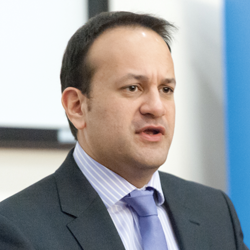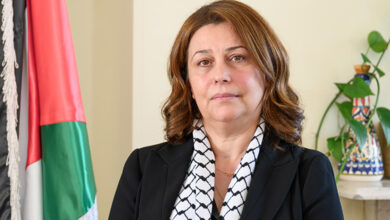Looking to Ireland’s transport’s future
 Transport Minister Leo Varadkar stated his priorities for the sector at the annual Transport Ireland conference. eolas reports.
Transport Minister Leo Varadkar stated his priorities for the sector at the annual Transport Ireland conference. eolas reports.
A new “more activist” ports policy, the possible re-introduction of a fuel rebate to help the freight sector and influencing European transport policy during Ireland’s Presidency of the Council of the European Union are being given precedence by Transport Minister Leo Varadkar.
Aviation and ports
Aviation is important to the economy, he told delegates. However, “the situation [at Shannon] is not sustainable.” Passenger numbers at the airport have declined by 43 per cent between 2009 (2,790,000) and 2011 (1,600,000). “The current situation can’t hold and we need to make big changes,” the Minister told delegates.
The transport department has been working with the airport and its partners and is “looking in great detail at what can be done in Shannon in terms of developing it as an aviation centre.”
On the regional airports, he commented: “This time last year, there were more regional airports than there are now. Two [Galway and Sligo] have lost their government funding, they no longer have any scheduled flights.” He added: “We just had too many airports and it wasn’t possible to sustain them all and the cost of that was falling on the tax-payer.”
Donegal, Knock, Kerry and Waterford are the remaining regional airports. They “know that they have until 2014 or 2015 to reach the stage where they are operating at a balance where they no longer need operating subsidies.” The Minister revealed: “I’m confident enough that at least two of those four will be able to meet that.”
Ports are of great interest to the Transport Minister and the formulation of a new ports policy is under way. It will “mark a move away from the laissez faire policy that was there in the past [i.e.] to set up a number of semi-state port companies and let them do their own thing and hope that it will work out.”
“That’s not the best policy in the interests of the public or in the interests of the tax payer,” Varadkar said. “It’s particularly not working out in the smaller ports which are losing a lot of business.”
At the moment, “it’s just the nature of the business that we are moving towards bigger ships, deeper water and bigger ports.”
Delegates were told: “Essentially what’s been happening over time is, to the extent that they had them, the reserves in those ports have been whittled away until there is nothing left and the Government has to intervene. At that point, the Government is intervening too late in a crisis situation when all the capital has been whittled away.”
The new policy will be “more activist.” It will “set a vision as to how our ports should work and it will be the role of the shareholder to set policy and intervene, where necessary, to ensure that that is done.”
At the moment, law and policy treat ports “as though they are the same but of course they are not the same.” The three core ports are Dublin, Cork and Shannon Foynes but the ports with regional importance and ports in transition “no longer get most of their revenue from maritime activity.” The new policy will make a distinction between those types of ports, the Minister outlined.
Rail and freight
The Government’s decision not to renew the derogation on the structure and management of the railways means that “by this time next year, we’ll have to have a certain degree of separation in Iarnród Éireann.” The details “haven’t exactly [been] worked out … but there will have to be separation between the operator element of the business and the infrastructure management,” he explained.
That could begin with a new infrastructure or services provider initially on the Dublin to Belfast line. The European Commission’s fourth railway package provides for the structural separation of railway activities, the liberalisation of the domestic railway passenger market and a mandatory independent regulatory body. This could lead to new providers on domestic lines, the Minister noted.
In terms of Ireland’s freight industry, the Minister noted: “It is in a very difficult position [with] falling demand and rising fuel prices.” He added that the Government “is under enormous pressure to reduce the cost of fuel and reduce taxes on fuel [but] that is extremely unlikely to happen unfortunately.”
While many transport companies are losing money or are heavily in debt,” Varadkar starkly pointed out: “There are none that are losing €15 billion a year and have debts of €160 billion, but the Government does. So anything we do has to be revenue-neutral or increase revenue for the Government.”
A working group has been established between the Department of Transport, Tourism and Sport and the Department of Finance to consider “the possibility of re-introducing a fuel rebate for essential users and changing the rules in relation to green diesel.”
The group is “really interrogating that idea of fuel tourism; that Ireland is losing out with people buying their fuel in Belgium for example, where they can get a rebate, or registering vehicles overseas rather than paying motor tax in Ireland, or the fact that a huge amount of diesel is now being washed.”
While new measures are being considered, the Minister explained that the motorway speed limit for heavy vehicles has been increased from 80 to 90 kilometres per hour from 1 April 2012 and some are now permitted to carry heavier loads “to allow the industry to become more competitive.”
€65 million will be spent on ‘smarter travel’ between 2011 and 2016. This will include more cycle lanes, pedestrian zones, real-time timetables, integrated ticketing and the extension of bike sharing to regional cities. West Cork, Dungarvan and Limerick have been identified as smarter travel areas.
“They are going to be developed up to what you would see in some cities around Europe in terms of accessibility for busses, cycling and pedestrians. It will be a good test for us to see to what extent it works and if it shows a meaningful shift to other modes of transport.”
Presidency
Ireland will hold the Council presidency in the first half of 2013 and the Minister outlined two priorities for that period: to finalise the trans-European conventional rail network Directive and to ensure that the air passenger rights Directive guarantees “that passengers on airlines are treated better than they are now.”
The trans-European rail Directive includes the requirement “to bring those motorways, railways and ports and airports identified as being part of a trans-European network up to a certain standard by 2013 to 2015.” The Minister added: “It’s important to get that right.”
Concluding, the Minister told delegates that his agenda “is a busy one” and that these are interesting times in which it is important to “get our state companies and local authorities into a better place so that when the upturn comes, we can capitalise on that.”
Transport Ireland 2012: Ministeral address: Dr Leo Varadkar, TD





